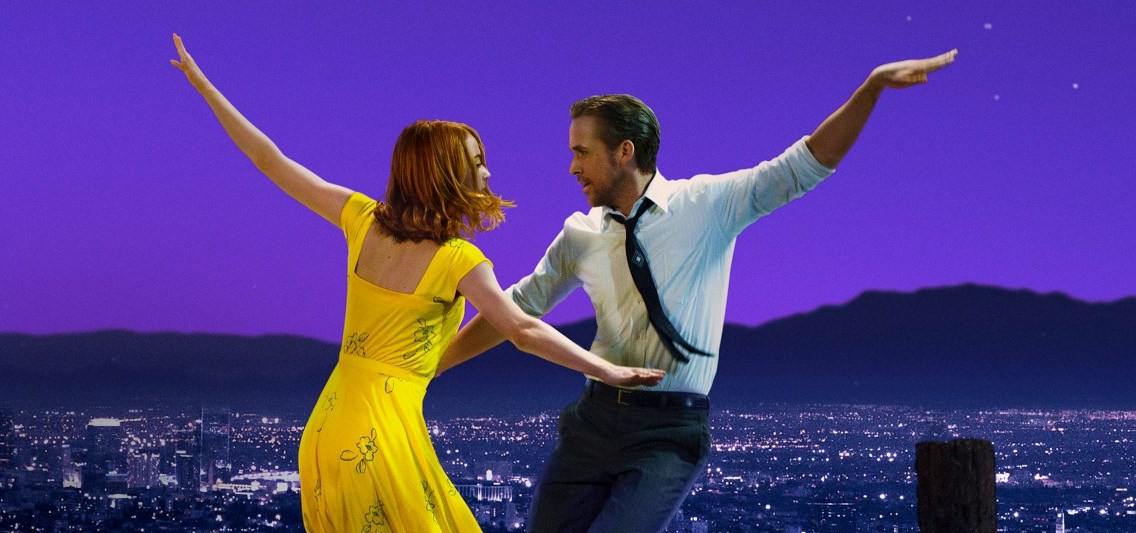By Hope Madden and George Wolf
2016 was a fairly weak, fairly bland year at the movies, but it still has surprises in store for us. Look at this…Suicide Squad is nominated for an Oscar! Okay, it’s for makeup and hairstyling – who knew that rolling around Hot Topic could translate to an Oscar nomination?
The official Academy Award nominations had few other surprises in store. La La Land racked up quite a haul of noms, most of which are likely to translate to statuettes. What’s the lowdown? Who should have made the list? Who shouldn’t have? Let us walk you through it.
Best Film
Arrival
Fences
Hacksaw Ridge
Hell or High Water
Hidden Figures
La La Land
Lion
Manchester by the Sea
Moonlight
Snubs: Zootopia, Jungle Book, The Witch, The Lobster, Jackie, Loving – there’s a bunch we’d have included instead of Lion, Hidden Figures or Hacksaw Ridge. Not that those are bad films – they are quite good. Just not as deserving.
Best Director
Denis Villeneuve, Arrival
Mel Gibson, Hacksaw Ridge
Damien Chazelle, La La Land
Kenneth Lonergan, Manchester by the Sea
Barry Jenkins, Moonlight
Snubs: No question Mel Gibson is out of his league here. While Hacksaw Ridge was a fine piece of filmmaking, it almost works in spite of Gibson’s direction. He begins with a Hallmark card then descends into carnage few other filmmakers care to capture. But the performances and the genuine merit of the story keep the film interesting. It’s not the direction, which is why we’d have honored David Mackenzie and his glorious direction for Hell or High Water instead.
Best Actress
Isabelle Huppert, Elle
Ruth Negga, Loving
Natalie Portman, Jackie
Emma Stone, La La Land
Meryl Streep, Florence Foster Jenkins
Snubs: It’s hard to even form this sentence, but Meryl Streep should not be on this list. We know! Blasphemy! But the pool for Best Actress is rarely this deep, and Annette Bening (20th Century Women) Rebecca Hall (Christine), or Amy Adams (Arrival) would have been better choices.
Best Actor
Casey Affleck, Manchester by the Sea
Andrew Garfield, Hacksaw Ridge
Ryan Gosling, La La Land
Viggo Mortensen, Captain Fantastic
Denzel Washington, Fences
Snubs: Not much to complain about here. The race is basically Affleck V Washington, with Affleck coming out on top, but we could have accepted Tom Hanks (Sully) or Nate Parker (The Birth of a Nation) in Garfield’s spot.
Best Supporting Actress
Viola Davis, Fences
Naomie Harris, Moonlight
Nicole Kidman, Lion
Octavia Spencer, Hidden Figures
Michelle Williams, Manchester by the Sea
Snubs: Here’s a weird yet valid complaint: the smart money’s on Viola Davis to win, but how in the hell is this a supporting role? Not only is Davis the only female on the screen for 9/10 of Fences, she has more screen time than Denzel. It’s her story. She’s not just the lead actress, she’s the lead. And her performance is more than strong enough to take home the best actress Oscar.
Best Supporting Actor
Mahershala Ali, Moonlight
Jeff Bridges, Hell or High Water
Lucas Hedges, Manchester by the Sea
Dev Patel, Lion
Michael Shannon, Nocturnal Animals
Snubs: First of all, amen to Michael Shannon. We could not be more pleased to see him hit this list. And halleluiah to Mahershala Ali – the likely front runner in the category.
We’d have given Dev Patel’s slot to Shannon’s Nocturnal Animals co-star Aaron Taylor-Johnson, and Ben Foster outshined his full slate of talented co-stars in Hell or High Water. He deserves Jeff Bridges’s spot.
Original Screenplay
Taylor Sheridan, Hell or High Water
Damien Chazelle, La La Land
Yorgos Lanthimos and Efthimis Filippou, The Lobster
Kenneth Lonergan, Manchester by the Sea
Mike Mills, 20th Century Women
Snub: This is a very solid and admirable list. Mike Mills’s 20th Century Women is brilliantly written and performed. We might swap him out, though, and give his spot to Robert Eggers’s The Witch.
Adapted Screenplay
Eric Heisserer, Arrival
August Wilson, Fences
Allison Schroeder, Theodore Melfi, Hidden Figures
Luke Davies, Lion
Barry Jenkins, Moonlight
Snubs: Hidden Figures and Lion were well put-together, lovely films. But in this year of searing, searching, brilliant writing, they have no place in this list. In their stead? Whit Stillman’s wicked and wonderful Love & Friendship and Tom Ford’s story within a story Nocturnal Animals.
Cinematography
Arrival
La La Land
Lion
Moonlight
Silence
Snubs: Chan-wook Park’s gloriously wrong The Handmaiden looked better than anything else that came out this year. It shouldn’t just be nominated, it should win. But it certainly should be perched in this category in Lion’s spot.
Foreign Language
Land of Mine
A Man Called Ove
The Salesman
Tanna
Toni Erdmann
Snubs: Again, where is the love for The Handmaiden? And the bigger surprise may be Elle, which nabbed a Best Actress nomination.
Documentary Feature
Fire at Sea
I Am Not Your Negro
Life, Animated
OJ: Made in America
13th
Snubs: Nope. Not a one. Every single one of these is required viewing. We’re hoping for some ties.
Animated Feature
Kubo and the Two Strings
Moana
The Red Turtle
Zootopia
My Life as a Zucchini
Snubs: No Finding Dory? We’re not sure that’s a snub, but it means no Pixar in this category, and we’ll call that a surprise.
We’ll have our official predictions a little closer to the Feb. 26th Oscar ceremony.









